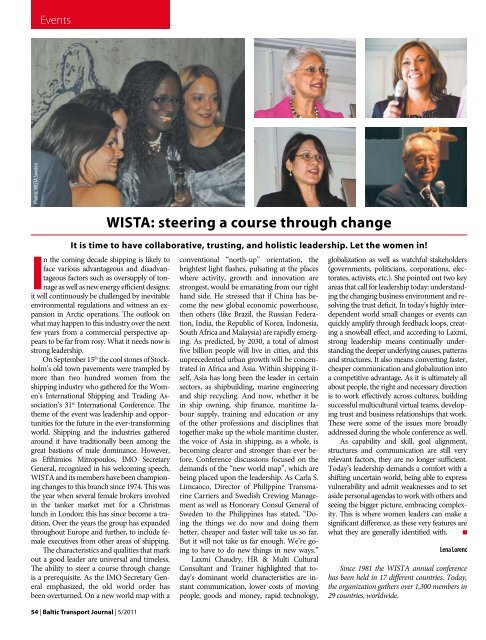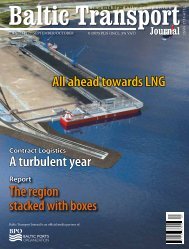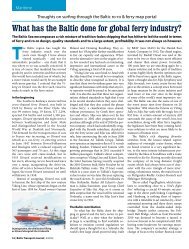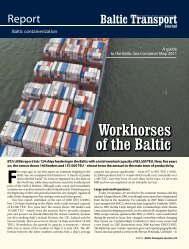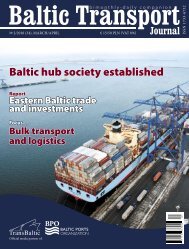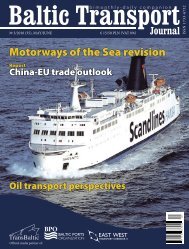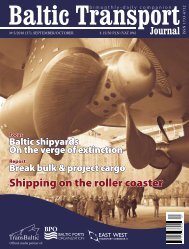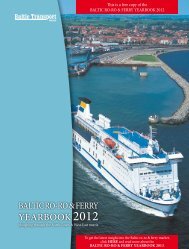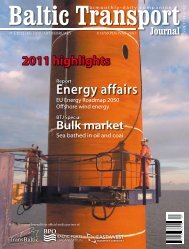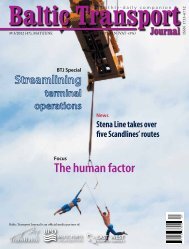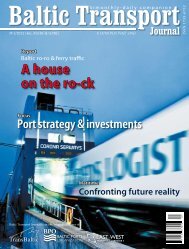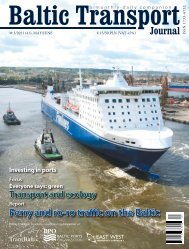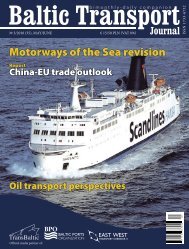BTJ 5/2011 - Baltic Press
BTJ 5/2011 - Baltic Press
BTJ 5/2011 - Baltic Press
- No tags were found...
You also want an ePaper? Increase the reach of your titles
YUMPU automatically turns print PDFs into web optimized ePapers that Google loves.
EventsPhotos: WISTA Sweden54 | <strong>Baltic</strong> Transport Journal | 5/<strong>2011</strong>WISTA: steering a course through changeIt is time to have collaborative, trusting, and holistic leadership. Let the women in!In the coming decade shipping is likely toface various advantageous and disadvantageousfactors such as oversupply of tonnageas well as new energy efficient designs;it will continuously be challenged by inevitableenvironmental regulations and witness an expansionin Arctic operations. The outlook onwhat may happen to this industry over the nextfew years from a commercial perspective appearsto be far from rosy. What it needs now isstrong leadership.On September 15 th the cool stones of Stockholm’sold town pavements were trampled bymore than two hundred women from theshipping industry who gathered for the Women’sInternational Shipping and Trading Association’s31 st International Conference. Thetheme of the event was leadership and opportunitiesfor the future in the ever-transformingworld. Shipping and the industries gatheredaround it have traditionally been among thegreat bastions of male dominance. However,as Efthimios Mitropoulos, IMO SecretaryGeneral, recognized in his welcoming speech,WISTA and its members have been championingchanges to this branch since 1974. This wasthe year when several female brokers involvedin the tanker market met for a Christmaslunch in London; this has since become a tradition.Over the years the group has expandedthroughout Europe and further, to include femaleexecutives from other areas of shipping.The characteristics and qualities that markout a good leader are universal and timeless.The ability to steer a course through changeis a prerequisite. As the IMO Secretary Generalemphasized, the old world order hasbeen overturned. On a new world map with aconventional “north-up” orientation, thebrightest light flashes, pulsating at the placeswhere activity, growth and innovation arestrongest, would be emanating from our righthand side. He stressed that if China has becomethe new global economic powerhouse,then others (like Brazil, the Russian Federation,India, the Republic of Korea, Indonesia,South Africa and Malaysia) are rapidly emerging.As predicted, by 2030, a total of almostfive billion people will live in cities, and thisunprecedented urban growth will be concentratedin Africa and Asia. Within shipping itself,Asia has long been the leader in certainsectors, as shipbuilding, marine engineeringand ship recycling. And now, whether it bein ship owning, ship finance, maritime laboursupply, training and education or anyof the other professions and disciplines thattogether make up the whole maritime cluster,the voice of Asia in shipping, as a whole, isbecoming clearer and stronger than ever before.Conference discussions focused on thedemands of the “new world map”, which arebeing placed upon the leadership. As Carla S.Limcaoco, Director of Philippine TransmarineCarriers and Swedish Crewing Managementas well as Honorary Consul General ofSweden to the Philippines has stated, “Doingthe things we do now and doing thembetter, cheaper and faster will take us so far.But it will not take us far enough. We’re goingto have to do new things in new ways.”Laxmi Chaudry, HR & Multi CulturalConsultant and Trainer highlighted that today’sdominant world characteristics are instantcommunication, lower costs of movingpeople, goods and money, rapid technology,globalization as well as watchful stakeholders(governments, politicians, corporations, electorates,activists, etc.). She pointed out two keyareas that call for leadership today: understandingthe changing business environment and resolvingthe trust deficit. In today’s highly interdependentworld small changes or events canquickly amplify through feedback loops, creatinga snowball effect, and according to Laxmi,strong leadership means continually understandingthe deeper underlying causes, patternsand structures. It also means converting faster,cheaper communication and globalization intoa competitive advantage. As it is ultimately allabout people, the right and necessary directionis to work effectively across cultures, buildingsuccessful multicultural virtual teams, developingtrust and business relationships that work.These were some of the issues more broadlyaddressed during the whole conference as well.As capability and skill, goal alignment,structures and communication are still veryrelevant factors, they are no longer sufficient.Today’s leadership demands a comfort with ashifting uncertain world, being able to expressvulnerability and admit weaknesses and to setaside personal agendas to work with others andseeing the bigger picture, embracing complexity.This is where women leaders can make asignificant difference, as these very features arewhat they are generally identified with. Lena LorencSince 1981 the WISTA annual conferencehas been held in 17 different countries. Today,the organization gathers over 1,300 members in29 countries, worldwide.


